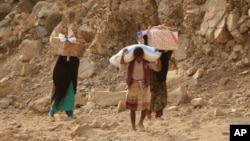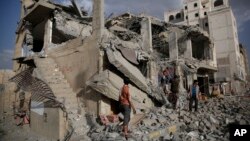The United Nations warns conflict-ridden Yemen is on the brink of a humanitarian catastrophe. It is urging donors to give generously to the $1.8 billion appeal it launched Thursday to provide critical and life-saving assistance to 13.6 million people, more than half the country’s population.
The U.N. reports more than 6,000 civilians have been killed and well over 3,000 wounded since the Saudi-led coalition began its bombing campaign against the Houthi rebels at the end of March of last year.
The U.N. says more than 2.5 million people have been forced to flee their homes and are internally displaced because of the conflict and that 21 million need humanitarian support.
Despite the situation, the U.N. humanitarian coordinator for Yemen, Jamie McGoldrick, says Yemen has become a forgotten crisis. He says Saudi airstrikes and ground fighting continue as relentlessly as ever, yet Yemen is being overlooked because of what is happening elsewhere in the Middle East.
“I do not think it is helpful to compare crisis for crisis, but I would say that Yemen is as difficult and as dangerous… maybe not in terms of scale, but in terms of intensity…. It has only been one year since the conflict started almost. We do not need this to last the way that Syria has lasted because then it becomes embedded and something much more terminal,” he says.
McGoldrick says the international community must do much more to prevent Yemen from sliding into the same quagmire as Syria. He says he agrees the U.N. humanitarian appeal for $1.8 billion dollar is unlikely to stop the war, but adds the money will save many lives.
McGoldrick says more than 14 million people in the country are going hungry and more than half that number are critically short of food.
“The people struggle on a daily basis to actually survive. The economic sector, the banking sector has all but collapsed. The basic services in the communities are falling apart. There are over 14 million people who lack access to adequate health care and there are some over 3 million women and children who need nutritional support,” McGoldrick says.
The U.N. coordinator says aid workers have difficulty accessing many areas because of the fighting and insecurity, but that humanitarian organizations have shown they are able to provide critical assistance if their operations are adequately funded.





